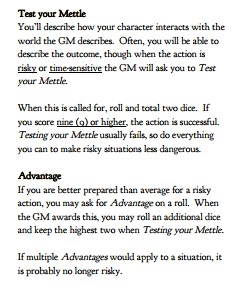Rolling under ability, is nice and easy, to grasp, no wonder why it’s one of the most common mechanic in RPG, knowing that I have a score of 60 means that I have 60% chance of success.
However, mechanically, system, I feel like Multi-dices, like WOD/Shadowrun work better. A big issue with single-dice system is the flat probability distribution meaning that an untrained person are a pretty high probability of success while a trained person as still a pretty high probability of failure. I like more mechanics with less randomness.
Removed by mod
As much as I like success counting systems, the speed of one die roll-under is really good if you are playing a game with lots of procedural rolls.
Success counting really benefits from games using concepts like let it ride from Burning Wheel (don’t keep rolling the same thing unless the situation changes significantly) and either extremely limited or highly abstracted combat.
GURPS is a 3d6 roll under, it’s nice
Indeed,
3D6 works way better than 1D20 as it makes character with a bad score, worse, character with a good score better, and character with an intermediate level decent. For a game, I replaced the 1D20 by 3D6, and I felt like it was an improvement, as suddenly outcome were more predictable.
At least with my player (at the time) it reduced tendencies to over optimize character, and frustration where these optimized character fail. It’s an easy house-rule that I would recommend when possible.
I like your point about multi dice systems being good because of how they represent skills non-linearly.
I did have to do a double take about you saying more games should play like shadow run though lol
Have to confess to not reading all that article BUT when I first played with the percentile checks from Basic Role-Playing, by the time I’d untrained the DnD logic from my brain I was fairly happy that it was a preferable way to do it. Rolling within your percentage ability to achieve something is simple, and you don’t have to calculate anything which can slow the game down
Do systems like that account for the difference in difficulty between different tasks with the same skill? Skimming the article makes it sound like the author wants to eliminate DCs, but those strike me as important. Otherwise the acrobat in the party is equally likely to fail to vault a railing as they are to perform their complicated high-wire routine.
From my experience with CoC you can adjust the difficulty by making a specific thing eg +20% harder or easier
It’s quite easy to adjust since it’s percentage chance, and you have more wiggle room than dc30
I’d also like a good answer. I feel like the author would say “you don’t even roll to vault a railing, you just do it”. But that still leaves a complicated but rehearsed high-wire routine versus “I run on water”. I wonder if the author would simply say no?
Most roll under percentile systems like GURPs / Call of Cthulhu have the concept of difficulty.
In those two systems, the GM can call the check “regular”, “hard”, or “extreme”.
On a hard check, you must roll under 1/2 your skill. On an extreme check, you must roll under 1/5 your skill.
I like roll under checks, but I disagree that they’re better for most people. People are too acculturated to roll-over, so it’s unintuitive to try and change them.




